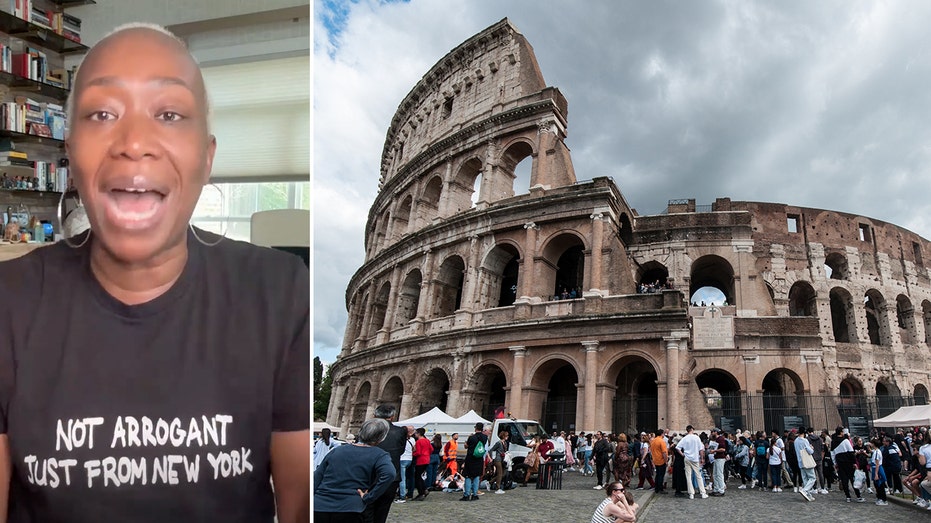In a daring commentary that has sparked discussions across social media platforms, former MSNBC host Joy Reid has posited that the decline of the Roman Empire was significantly influenced by its failure to embrace diversity. Reid’s assertion comes amid an engaging dialogue about societal values and the importance of inclusivity in contemporary America.
Reid, known for her outspoken views and analysis of socio-political issues, made these claims during a segment that examined the intersections of history and modernity. Her argument centers on the premise that just as the Roman Empire struggled due to its inability to incorporate diverse cultures and perspectives, the current state of the United States could face similar consequences if it continues down the path of exclusion and divisiveness.
The former host’s reflections drew on historical evidence to illustrate how the Roman Empire, once a beacon of strength and multiculturalism, began to falter when it became less welcoming to diverse populations within its territories. Reid noted that as the empire expanded, it brought numerous cultures under its vast umbrella, contributing to a rich tapestry of beliefs, traditions, and customs that fueled innovation and growth. However, as political corruption, economic strife, and social discord grew, the empire’s inability to unify its diverse constituents led to unrest and ultimately, its demise.
In her remarks, Reid suggested that a failure to embrace diversity in contemporary America could herald a similar fate. She emphasized the importance of inclusivity, advocating for a collaborative society where various voices are heard and valued. “Without the contributions of diverse groups,” she stated, “a society cannot thrive. It becomes stagnant, constrained by groupthink, which is dangerous for democracy.”
Reid’s statements have ignited a significant response from both supporters and critics. Advocates of her position agree with her analysis, pointing to increased polarization in American politics as a troubling trend that mirrors the divisions that plagued ancient Rome. They argue that fostering diversity and inclusion can lead to more robust communities that are resilient in the face of change.
Conversely, detractors have taken issue with Reid’s historical comparisons, arguing that the complexities of the Roman Empire’s decline extend far beyond the parameters of diversity. Critics contend that factors such as economic instability, military overreach, and political fragility were also pivotal in the empire’s downfall. Some assert that focusing solely on diversity as a cause oversimplifies the complexities involved in such a monumental historical event.
In response to her critics, Reid has reiterated that her argument is not meant to diminish the multifaceted nature of historical decline, but rather to illuminate how modern societies can learn from the past. “Understanding historical precedents is essential,” she elaborated. “The lessons we draw from the fall of great civilizations, including Rome, offer invaluable insights into our sociopolitical challenges today.”
As Reid’s commentary continues to reverberate in the national conversation, it has also drawn parallels with present-day movements advocating social justice, equity, and representation. The growing sentiments around Black Lives Matter, LGBTQ+ rights, and immigration reform are reflective of a broader societal shift towards recognizing and valuing diversity as an essential element for survival and progress.
Organizations and activists around the United States have rallied behind this idea, pushing for systemic changes that aim to address inequalities rooted in racism, sexism, and other forms of discrimination. The message is clear: prioritize inclusivity, or risk society’s stability and strength.
The notion of diversity being foundational to societal health is not entirely new. Numerous academic studies support Reid’s perspective, suggesting that communities characterized by a variety of cultures and experiences often yield higher levels of innovation, problem-solving, and productivity. As companies increasingly recognize the value of diverse workforces, there is also a growing acknowledgment that a collective effort from all societal sectors leads to a more vibrant, resilient, and cohesive environment.
Reid’s commentary also aligns with recent research that has shown that nations that embrace multiculturalism are often more capable of adapting to global challenges, such as economic fluctuations and technological advancements. By pooling together diverse perspectives, societies can better anticipate challenges and implement innovative solutions.
For advocates of diversity, Reid’s remarks serve as a rallying call to emphasize the urgency of addressing inequities and fostering an inclusive society. They argue that, just as the Roman Empire could not withstand the tides of change without embracing diversity, contemporary America must also prioritize the inclusion of all its citizens to secure a strong and stable future.
In cities across the nation, local leaders and community organizers are amplifying this message, initiating dialogues and programs aimed at bridging gaps created by racial and economic disparities. Grassroots initiatives focused on multicultural education, representation in local governance, and accessible resources are gaining traction, promoting an understanding of how inclusion benefits all members of society.
As Reid continues to share her views, the discourse around the relevance of history in understanding modern society remains vital. Her assertions challenge individuals to reconsider the narratives around decline, resilience, and unity. The stakes, as she suggests, could not be higher: fostering a society that upholds diversity as a strength may very well be the key to averting a fate similar to that of ancient Rome.
In summary, Joy Reid’s provocative commentary on the Roman Empire’s fall and her warning to contemporary America about the dangers of exclusion have reignited a crucial conversation about diversity and inclusion. Whether one agrees with her historical interpretation or not, the underlying message about the necessity of embracing multifaceted perspectives for societal progress is clear. As discussions continue, it remains essential for Americans to reflect on their shared values and how they can work together to build a society that honors and respects the richness of its diversity.
































